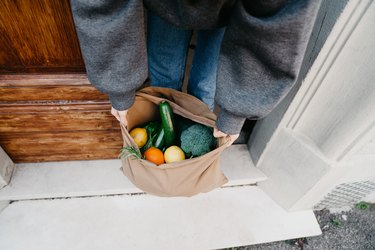
Food can have a major impact on your blood pressure status. By eating an anti-hypertensive diet, you may be able to successfully treat, or even reverse, high blood pressure.
Blood Pressure Basics
Video of the Day
Blood pressure is the force of exertion against your artery walls that your heart uses to pump blood. Measured in millimeters of mercury, systolic pressure (the first or top number) measures the force of exertion of each heartbeat, while diastolic pressure (the second number) measures the force between each heartbeat, according to the American Heart Association.
Video of the Day
Here's what readings (in millimeters of mercury) say about your blood pressure:
- Normal: Below 120/80
- Elevated: 120 to 129 systolic and 80 or below diastolic
- Stage 1 hypertension: 130 to 139 systolic or 80 to 89 diastolic
- Stage 2 hypertension: 140 or higher
systolic and/or 90 or higher diastolic
If you're diagnosed with Stage 1 or 2 hypertension, treatment is likely to include medication, according to the U.S. National Library of Medicine, but diet should also be part of the plan.
A low-glycemic, anti-inflammatory modified Mediterranean diet — such as the Cardiometabolic Food Plan from the Institute of Functional Medicine — can be beneficial for the prevention and treatment of hypertension because it uses targeted medicinal foods that can help treat the underlying causes of cardiovascular and metabolic dysfunction, according to Heather Carrera, DCN, CNS, the nutrition and wellness manager at SUNY Geneseo.
"A Mediterranean diet is comprised of fruits, vegetables, whole grains, nuts, legumes, dairy, extra virgin olive oil, spices, modest amounts of poultry, fish and red meat, and red wine," says Carrera. "It's the combination of all of these foods together that is responsible for the cardiovascular benefits, including lowering blood pressure."
Foods That Mimic Medications
While medications may be necessary for the treatment of hypertension in some cases, Carrera notes that many people can achieve a reduction in their dosage, or even eliminate the need for medication entirely, by making the right dietary and exercise changes.
"Certain foods actually mimic the actions of specific medications and can be used in conjunction with the medication to increase their effectiveness," she explains. "For example, angiotensin converting enzyme (ACE) inhibitors, such as Lisinopril, are medications that relax the blood vessels and help dilate them, thus lowering blood pressure. Certain foods have a similar effect, including garlic, seaweed, sardines, hawthorn tea and pomegranate."
Other classes of medications often used to treat hypertension include diuretics, such as spironolactone, and calcium channel blockers, such as amlodipine. While medication can help to lower blood pressure, it's important to remain aware of other effects they can have on your overall health.
"Diuretics, for example, lead to an increased need for potassium, magnesium, phosphorus, sodium, chloride, folate, B6, zinc, iodine and CoQ10," says Carrera. "Special care must be taken to replace these nutrients through diet or supplementation."
Supplements can also have a lowering effect on blood pressure. Magnesium is a vasodilator and natural calcium channel blocker, so it can be used to reduce blood pressure, while vitamin C has been shown to improve blood vessel function and lower blood pressure, Carrera adds.
Foods to Avoid
"Elevated blood sugar contributes to hypertension, so any anti-hypertensive diet should focus on limiting or avoiding added sugars and refined carbohydrates," says Carrera. It also makes sense to limit foods and beverages known to increase blood pressure, she says, noting that these may include foods high in sodium, processed foods, caffeine, soft drinks and excessive alcohol.
However, not everyone is salt-sensitive, and therefore not everyone with high blood pressure has to restrict sodium in their diet, according to Carrera. "People over age 50, African Americans and those with familial hypertension are more likely to be salt sensitive, and likely also need additional potassium to balance excess sodium in their diets," she says. "Potassium can be found in foods like avocados, spinach and sweet potato."
Carrera also recommends incorporating foods that have properties similar to diuretics, such as celery, and to calcium channel blockers, like flaxseed, garlic and omega-3 fatty acids from cold-water fish. "By including these types of foods on a daily basis, you can reduce the need for medication naturally," Carrera says.